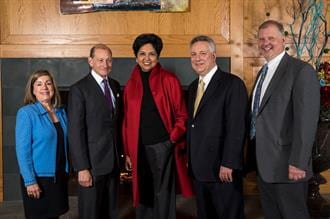
Indra Nooyi (center), former chairman and CEO of PepsiCo, was the John L. Weinberg Distinguished Speaker at the symposium. Joining her were, from left, Weinberg Center Associate Director Ann Mule, Weinberg Center Director Charles M. Elson, UD President Dennis Assanis and College of Arts and Sciences Interim Dean John A. Pelesko.
Indra Nooyi, the former chairman and CEO of PepsiCo, had some words of advice for current and future business leaders at the University of Delaware on March 20:
Competence. Curiosity. Courage. Confidence.
Developing and relying on such qualities, in addition to “critically important” communications skills, is essential to success, she told the audience at a symposium organized by UD’s John L. Weinberg Center for Corporate Governance.
And remember to be a lifelong learner, she advised the students in attendance, adding, “I’m still a student” today.
Nooyi, who has won acclaim for her highly successful 12 years at the helm of PepsiCo and for her advocacy of corporate social responsibility, shared another thought about leadership.
“Never forget that running a corporation is an enormous responsibility,” she said — not just to the company’s financial bottom line but also to its long-term impact on employees, customers, the environment and society.
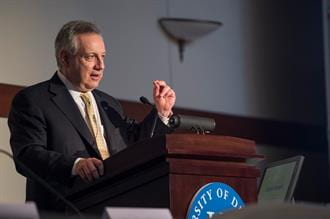
UD President Dennis Assanis welcomes the audience.
University President Dennis Assanis welcomed a record crowd of about 350 to the annual event and thanked Nooyi and the symposium’s other speakers and panelists for their participation.
“I’m looking forward to hearing their thoughts and insights into the very important topic of good corporate governance,” he said, noting that the education of UD students is enhanced by having access to such distinguished speakers.
“The Weinberg Center is an important part of the University of Delaware,” Assanis said. “They’ve developed a deep expertise in corporate governance, and they’re known for their thought leadership and independence.”
In her conversation with Elson, who is the Edgar S. Woolard Jr. Chair in Corporate Governance and a professor of finance at UD, Nooyi also spoke about some of her work in transforming PepsiCo, where she was one of the few female chief executives of a Fortune 500 company. During her tenure, PepsiCo grew net revenue more than 80 percent, and the company’s total shareholder return was 162 percent.
She led initiatives to develop healthier snack foods and beverages, and the company experienced an 80 percent growth in sales under her leadership. Nooyi often described herself as a consumer as well as an executive, saying that she visited grocery stores and took note of PepsiCo’s packaging and other features.
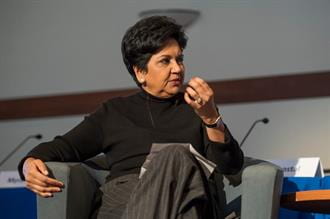
Indra Nooyi speaks at the Weinberg Center symposium.
Asked by Elson whether the company had changed consumer preferences or if those new preferences had changed PepsiCo, Nooyi replied, “Both.”
While traditional Pepsi was once the top beverage choice of the company’s customers, that shifted over several recent years to sugar-free soda and then to bottled water, she said.
“The writing was on the wall,” she said about the need for the company to change its strategy and its product offerings. “If that’s not consumer shift, what is?”
She and Elson also spoke about the need for corporations to invest in their long-term success and discussed the responsibilities of boards of directors.
Since stepping down as PepsiCo’s chief executive in October, Nooyi has joined the board of Amazon.
“I’ve been on both sides of the divide” as a CEO and a board member, she said. “It’s very important to understand the roles.”
Nooyi’s talk was followed by special speaker Robert J. Jackson Jr., a commissioner with the Securities and Exchange Commission, who spoke about such issues as dual-class stock and cybersecurity, then fielded questions and comments from the audience.
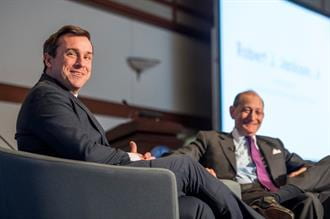
SEC Commissioner Robert J. Jackson Jr. (left) takes questions from the audience and from Charles Elson.
Dual-class stock, in which companies issue different types of shares that have different voting rights, has been criticized for giving disproportionate control to a relatively small number of investors. Jackson said he’s taken “a more nuanced view” that such structures might work for a finite period of time but should probably not continue through generations of shareholders.
He also spoke about his concern that companies experiencing data breaches often don’t inform investors in a clear or accessible way about the details of what happened. The information may be posted on a website but not be easy to find, he said.
“Do we really want some people to be better informed than others?” Jackson asked on behalf of “ordinary investors.”
Discussions of issues such as dual-class stock continued during a panel discussion in which experts in various aspects of corporate governance cited issues they felt were currently of critical importance to investors and boards of directors. Those issues included the structure and diversity of boards, corporate environmental and social responsibility and the rights of shareholders.
Aeisha Mastagni, portfolio manager for the California State Teachers’ Retirement System, said her members are focused on such issues as low-carbon investments and diversity on corporate boards.
“We know it’s not our job to tell them how to run their company, but we’re asking hard questions,” she said.
Panelist Myron T. Steele, a partner at Potter, Anderson and Corroon LLP and former chief justice of the Delaware Supreme Court, said the concept of ESG (an emphasis on environmental, social and governance issues) is revolutionizing the role of boards and their relationship with investors.
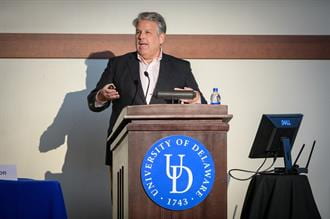
Financial journalist, author and former Wall Street trader William D. Cohan delivers the luncheon address at the event.
“Thoughtful investors are interested in these issues,” he said, so corporations must address them in order to be successful.
Other members of the panel, which was moderated by Elson, were: Glenn Booraem, investment stewardship officer and a principal with Vanguard; Steve Odland, president and CEO of The Conference Board; and Eric Shostal, vice president, investor stewardship team, with BlackRock.
The symposium also featured a lively luncheon talk by William D. Cohan, New York Times best-selling author, special correspondent at Vanity Fair and a former senior Wall Street mergers and acquisitions banker. He has written three nonfiction books about Wall Street.
Cohan summarized his in-depth reporting for Vanity Fair about the CBS-Viacom merger and the continuing fight for control over the companies. He detailed some of the personal, financial and family intrigue that has characterized the years-long battles in courtrooms and boardrooms involving billionaire media mogul Sumner Redstone and his daughter, Shari, including issues that arose in this fight related to dual-class stock.
About the Weinberg Center and the symposium
The John L. Weinberg Center for Corporate Governance, part of the College of Arts and Sciences, is nearing its 20th year at the University of Delaware.
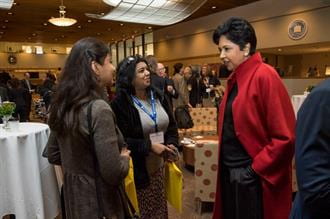
Indra Nooyi chats with some of those attending the corporate governance symposium in Clayton Hall.
Founded in 2000, it is one of the longest-standing corporate governance centers in academia and the only one in the state of Delaware, the legal home for a majority of the nation’s public corporations.
In his opening remarks at this year’s Corporate Governance Symposium, Assanis said the University is proud of the center’s work. He cited the fact that it is now the successor organization to the Investor Responsibility Research Center Institute and has a partnership with the Investor Stewardship Group.
“At UD, we see it as our mission to be this kind of intellectual intersection where academic research meets real-world challenges to create sustainable and socially responsible solutions,” he said.
John A. Pelesko, interim dean of the College of Arts and Sciences, also welcomed the symposium participants and audience.
He noted the important research the center does in areas of corporate governance and capital markets, while providing a range of educational opportunities for UD students.
“The Weinberg Center is increasingly positioned to address these important issues,” Pelesko said.
The Corporate Governance Symposium was co-sponsored by the Weinberg Center and by the Department of Finance in UD’s Alfred Lerner College of Business and Economics.
Academic papers presented
The annual symposium included a presentation and discussion of academic papers, which were selected from work submitted from around the world.
Honored with the Best Paper Award was “Audit Process, Private Information, and Insider Trading,” by Salman Arif and Joseph Schroeder, both of the Kelley School of Business at Indiana University, and John Kepler and Daniel Taylor (presenter), both of the Wharton School at the University of Pennsylvania. Taylor is a 2003 UD alumnus, with a degree in finance and economics, and a former student of Elson’s.
Leading the discussion of that paper was W. Robert Knechel of the University of Florida’s Fisher School of Accounting.
The other papers presented at the symposium were:
“Investors’ Attention to Corporate Governance,” by Peter Iliev, Penn State University; Jonathan Kalodimos, Oregon State University; and Michelle Lowry (presenter), Drexel University; discussed by Alan Crane, Jones Graduate School of Business, Rice University.
“Investor-Driven Governance Standards and Firm Value,” by Yonca Ertimur, University of Colorado, Boulder, and Paige Patrick (presenter), University of Washington; discussed by Fei Xie, Alfred Lerner College of Business and Economics, University of Delaware.
“Shareholder Voting on Golden Parachutes: Determinants and Consequences,” by Albert H. Choi (presenter), University of Virginia Law School; Andrew C.W. Lund, John F. Scarpa Center for Law and Entrepreneurship, Villanova University’s Charles Widger School of Law; and Robert Schonlau, Farmer School of Business, Miami University; discussed by John White, Cravath Swaine and Moore.
Article by Ann Manser; photos by Kathy F. Atkinson and Evan Krape

